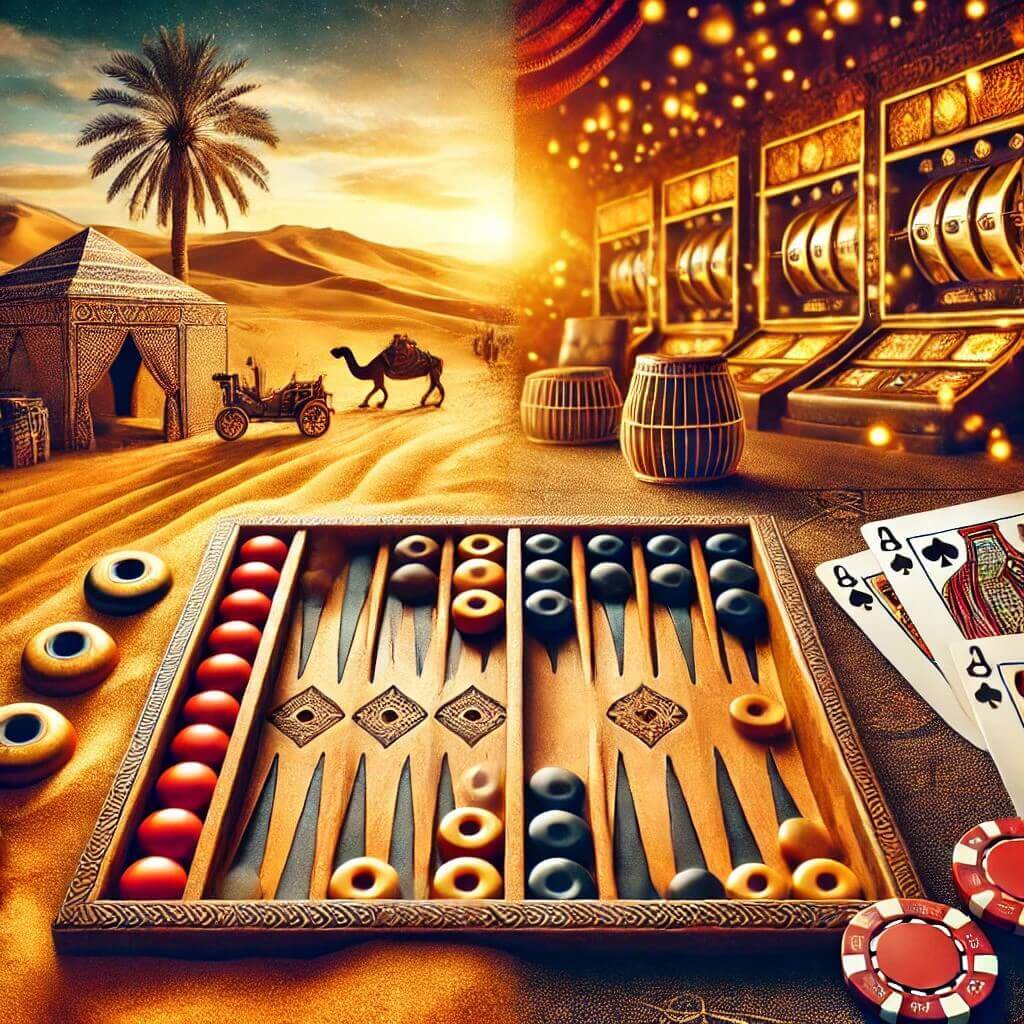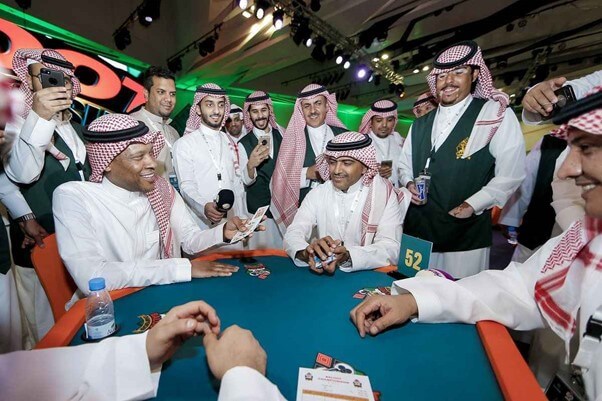A Guide to Traditional Arab Games and Their Modern Casino Counterparts
Games have been an integral part of Arab culture for centuries, serving not only as a form of entertainment but also as a means to foster social interaction, intellectual development, and cultural exchange. From the tactical strategy of Al-Qirkat, often viewed as a precursor to backgammon, to the intricate moves of Mancala, traditional Arab games are steeped in history and reflect the values of logic, patience, and skill. These games have not only survived through generations but have also played a key role in strengthening community bonds, with gatherings centered around competitive and often collaborative gameplay.
Read more +
The Evolution History of Gambling in the Arab World
Betting and chance-based activities have long been an integral part of human societies, evolving through myriad cultural, social, and economic transformations. In a certain corner of the globe, these practices reflect a unique tapestry of traditions, beliefs, and regulations that shape their significance within various communities. Understanding these practices offers insight not only into recreational pursuits but also into deeper societal values and norms.
Throughout time, regions have witnessed the interplay between luck and strategy, with games and stakes becoming synonymous with social gatherings and communal ties. As diverse as the people themselves, these wagering activities have often been influenced by local customs and religious principles, creating a fascinating narrative that intertwines leisure with moral considerations. Exploring this vibrant narrative reveals a complex relationship that continues to evolve in contemporary society.
From ancient customs to modern manifestations, one can observe a dynamic evolution marked by changing attitudes and regulatory frameworks. Local influencers and global trends simultaneously shape how individuals engage with these activities, presenting a rich field for exploration. As we embark on this examination, we uncover the intricate layers that define not just the act of betting, but its surrounding context within a broader cultural spectrum.

The Origins of Gambling in Arabia
The practice of chance-based activities has deep roots in the culture of the region, reflecting a blend of tradition, competition, and social interaction. From ancient times, various forms of entertainment involving luck and skill emerged, evolving alongside the sociopolitical landscape of local communities.
In early civilizations, games of chance were often linked to significant events and rituals, serving as a means to invoke fortune or predict outcomes. Evidence suggests that such amusements were prevalent among different tribes, indicating a widespread acceptance of these practices as part of social gatherings and celebrations.
As time progressed, influences from neighboring cultures enriched local customs, introducing new elements and regulations. This amalgamation led to a variety of games, each with its unique rules and significance, often reflecting the values and beliefs intrinsic to society.
The development of chance-related activities also coincided with trade expansion, as itinerant merchants brought novel ideas and practices from afar. These interactions not only diversified local pastimes but also contributed to the establishment of informal wagering systems, embedding the allure of risk and reward into everyday life.
Moreover, oral traditions and folklore became intertwined with these activities, preserving tales that celebrated victories and lamented losses. This narrative aspect added layers of meaning to the acts, transforming them from mere games into emblematic representations of luck, fate, and community bonds.
Overall, the early beginnings of such pastimes in the region reflect a rich tapestry of cultural exchanges, social dynamics, and human fascination with chance, laying the groundwork for the diverse practices seen today.

Modern Gambling Practices in Arab Nations
In recent years, a significant transformation has taken place regarding wagering activities across various nations in the region. This evolution reflects changing cultural attitudes, economic dynamics, and technological advancements that influence how individuals engage with chance-based entertainment. This section explores the diverse forms and settings in which such activities are practiced today, shedding light on both legal frameworks and social perceptions.
Online Platforms have surged in popularity, allowing enthusiasts to participate in games of chance from the comfort of their homes. Numerous websites cater specifically to audiences in these territories, offering an array of options from sports betting to virtual card games. However, regulations surrounding these platforms vary widely, as local governments grapple with balancing economic opportunities against traditional values.
Casino Developments have also emerged, particularly in states that are more open to integrating international tourism. These venues often attract foreign visitors while providing a source of employment and revenue for local economies. However, they exist within a complex web of regulations, where some nations prohibit such establishments altogether, while others pursue extensive licensing and control measures to ensure compliance with local customs.
Additionally, Social Gaming has become a popular trend, where individuals engage in skill-based competitions for prizes. These activities often circumvent legal restrictions, as they focus on competitive elements rather than pure chance. Many platforms capitalize on this by creating games designed to entertain while subtly integrating the thrill of potential rewards.
Lastly, Local Cultures continue to shape the practices surrounding these activities. Attitudes towards risk, rewards, and ethics influence how individuals participate and perceive these ventures. As societal norms evolve, a dialogue has begun about the sustainability and morality of engaging in such practices, balancing modernity with respect for tradition.
Legal Framework Surrounding Betting Activities
This section explores the regulatory landscape governing wagering practices across various nations in the region. The legal parameters encompass a multitude of aspects, ranging from prohibitive measures to regulated markets, influencing how individuals engage with betting establishments.
Many jurisdictions uphold stringent laws against wagering, reflecting cultural, religious, and historical influences. However, some areas have adopted more lenient approaches, establishing controlled environments for betting activities. Key factors in this legal framework include:
- Religious prohibitions: Many societies adhere to beliefs that discourage or outright ban betting, viewing it as morally unacceptable.
- Government regulations: Authorities often implement licensing requirements for operators to ensure consumer protection and generate tax revenue.
- Online platforms: The rise of digital gambling has prompted lawmakers to reevaluate existing regulations to accommodate new technologies.
Enforcement of these laws varies significantly, with some countries employing strict penalties for violations, while others adopt a more lenient stance, often overlooking informal betting practices that occur outside the mainstream market.
As social attitudes evolve, the balance between tradition and modernity continues to shape legal discussions surrounding betting, leading to ongoing debates about potential reforms in legislation.
Influence of Islam on Gambling Perspectives
The interplay between faith and leisure activities has significantly shaped societal norms within regions where Islamic teachings prevail. Central to this dialogue is the moral framework established by religious tenets, which often dictate acceptable pastimes and behaviors. This relationship cultivates a distinctive viewpoint on recreational activities involving chance, ultimately influencing individual choices and community values.
Islamic doctrine lays a foundational principle that pursues ethical conduct and the avoidance of harm. Consequently, practices deemed as uncertain or risking financial loss are scrutinized through this lens. The religious narrative presents a clear stance against specific forms of play, attributing these pursuits to potential negative consequences on personal, familial, and societal levels.

Within Islamic texts, references highlight the adverse implications of engaging in interactive diversions that rely heavily on luck or chance. Such activities are often associated with moral decay, the potential for addiction, and an erosion of productive endeavors. The teachings emphasize accountability and well-being, steering followers toward more constructive alternatives that align with spiritual and ethical guidelines.
The prevailing sentiments reveal a collective desire to maintain harmony and prevent discord, positioning recreational pastimes as potentially disruptive influences. As such, many communities cultivate a mindset that promotes responsible leisure activities while discouraging those associated with unpredictability. This ingrained belief system continues to shape social interactions and personal pursuits, reflecting a legacy of adherence to religiously inspired values.
Traditional Games and Cultural Significance
In various regions of the Middle Eastern landscape, time-honored pastimes serve as more than mere entertainment; they embody rich narratives, social interactions, and cultural values. These games have long been integral to communal gatherings, reflecting local customs and fostering connections among individuals. Their enduring presence highlights the importance of cultural heritage in everyday life.
Social Bonds and Community Engagement
Participating in traditional games often facilitates better relationships within communities. Gatherings centered around these activities create opportunities for individuals to bond, share stories, and cultivate a sense of belonging. Games such as backgammon and dominoes are frequently played during festive occasions, where families and friends come together, reinforcing social ties while passing down traditions to younger generations.
Cultural Reflection and Identity
Beyond social aspects, these games encapsulate the unique identity of different regions. They often incorporate elements that reflect historical events, local legends, or moral lessons, making them repositories of cultural narratives. For example, the game of carom showcases strategic thinking, mirroring values such as patience and resilience that are esteemed within these societies. Thus, engaging with traditional pastimes allows individuals to connect with their roots and appreciate the local heritage that shapes their identities.
Online Gambling Trends in the Middle East
The realm of digital wagering in this region has witnessed significant evolution in recent years. With advances in technology and shifting cultural attitudes, many individuals have started to explore online platforms as an alternative to traditional betting venues. This section delves into the patterns emerging in the sphere of digital betting and its impact on society.
Shifts in User Demographics
As access to technology has improved, the demographics of online participants have diversified. Younger generations, accustomed to smartphones and the internet, are increasingly engaging in virtual gaming activities. The following table highlights key demographic trends influencing online play in the region:
| Age Group | Percentage of Participants |
|---|---|
| 18-24 | 45% |
| 25-34 | 35% |
| 35-44 | 15% |
| 45+ | 5% |
Emerging Technologies Influencing Gaming Platforms
Innovations such as blockchain, augmented reality, and artificial intelligence are transforming how online activities are conducted. These technologies provide enhanced security, personalized experiences, and engaging interactive features that appeal to a broader audience. As digital entertainment continues to grow, it is essential to monitor these advancements and their implications on user engagement and regulatory aspects.

You May Also Like

With over a decade of experience in the gambling industry, encompassing both traditional and online gaming, the author has established themselves as a seasoned expert. What initially began as a simple hobby of crafting descriptions for casinos and online slot machines gradually evolved into a daily pursuit, consuming a significant portion of their time. Martins doesn’t limit their writing to online casinos alone, but also offers valuable insights into the world of sports betting. This extensive background ensures a wealth of knowledge and expertise in the field of gambling.














